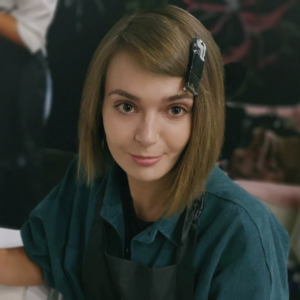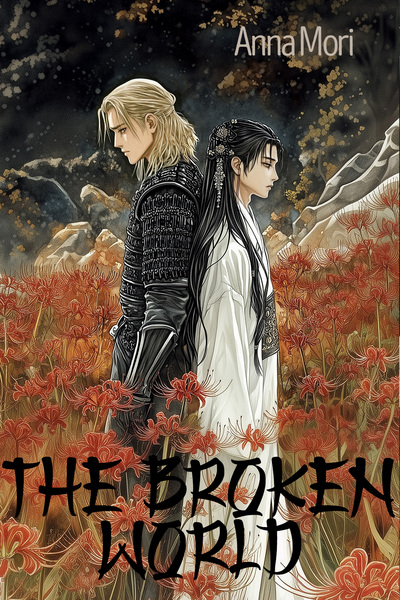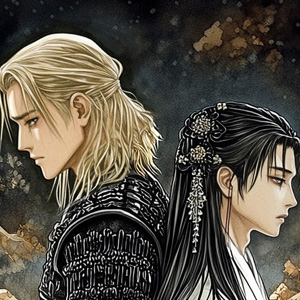Although Gerel's conversation with Yukinari had ended in stalemate, leaving little hope for successful negotiations, the emperor showed no inclination to withdraw his hospitality. Gerel and his delegation were to remain in the palace for a full month.
Staying in Ryukoku felt strange.
When Gerel had first arrived in the Land of the Tortoise, everything had seemed equally unfamiliar, but there, logic and practicality underpinned their customs. With enough observation and his natural restraint, he had managed to adapt.
Here, however, things were different.
He quickly realized that anyone seeking acceptance among Ryukoku's aristocracy had to master an intricate system of signs and symbols. Every color, plant, animal, and object carried its own meaning, and combinations of colors in clothing signified rank, age, and even the season. Wearing an incorrect combination elicited silent disapproval, though no one would say it outright. Even the script chosen for a letter or the color of the paper mattered. These symbols existed in the Land of the Tortoise too, but in Ryukoku, they had been elevated to an absolute art form.
Gerel didn't demand his men adorn themselves in silks or learn this symbolic code — he understood how foolish they would look. Instead, he continued to wear his military uniform: the armored garb of Cheongju, complete with the long, plated skirt that fell below the knee. The uniform's black hue and severe silhouette, cinched at the waist with a wide belt, stood in stark contrast to the flowing, multicolored silks of the courtiers, appearing almost as a deliberate challenge. Shadowy and imposing, they moved through the palace, still armed — an unspoken assertion that disarmed them in spirit only.
They were even invited to attend the Festival of the Seven Autumn Grasses.
The event took place in the palace gardens after sunset. The courtiers set colorful paper lanterns and wreaths of autumn flowers — bellflowers, clovers, silvery plumes of miscanthus — adrift on the water. They competed in a poetry contest, reciting impromptu verses infused with a delicate sadness fitting the occasion.
Gerel's soldiers watched with bemused disdain.
"Does the general truly mean to turn us into mincing copies of these half-men? There will never be peace between us. A hundred years from now, they'll still call us barbarians."
"Perhaps if we learned from them, they'd stop calling us that," Gerel retorted irritably.
Yet, even he could see the truth in their words: understanding between their peoples would not come — not in this generation, nor the next.
The festival and the courtiers' behavior seemed unbearably artificial to him. Still, Gerel could appreciate the beauty of the night, the waning yellow moon, the faintly bitter scent of a garden touched by the first signs of decay. He admired the paper lanterns and their reflections dancing on the dark surface of the stream. There was something almost familiar in the scene; in Yuigui, lanterns were also set afloat, though there, it was to make wishes.
But in Cheongju, simplicity and harsh reality reigned. The most sophisticated pastimes Gerel's soldiers knew were horse racing, duck hunting, and drinking contests.
He had begun to understand Ryukoku's language well enough to follow casual conversations, but the layered metaphors of their poetry often escaped him. Even so, when one courtier set his wreath afloat and recited:
"If only, in this brief life,
I could weave into the fabric
just one flower —
even a simple field cosmos..."
And another, a young man with striking eyes framed by lashes thick as pine boughs, responded:
"But when my years fall away like autumn leaves,
will that cosmos become part of the pattern,
or will the wind tangle the threads and carry them away?"
— Gerel understood the meaning, and he liked the poems. Yet others at the gathering shook their heads disapprovingly. At this court, they preferred poems that were elegant and meaningless, about flowers or rain. The beauty of sincerity was out of fashion.
"These verses are exquisite, my dear Ashikage," said a familiar voice, warm with genuine admiration.
Gerel didn't need to turn to know it was Yukinari. Of course it was him — the only one present with his face obscured by a silk veil.
"It won't be easy to respond to you in kind, but I will try," the emperor said, before reciting:
"Snow falls upon my grave — winter has come.
But over your home, rain still pours,
leaves still circle —
week after week,
month after month."
The courtiers clapped politely, though the poem was as stark and unorthodox as the last. The young man with the piercing eyes glanced at the emperor with gratitude and immediately offered his reply:
"If only I had a voice to remind you of spring,
hands to weave a wreath of primroses —
but I have neither."
Yukinari answered:
"How dare magnolias bloom in spring —
so mercilessly joyful,
as if sorrow and death did not exist."
Gerel thought their exchange of death-laden verses sounded like fragments of a private dialogue, torn from some story no one else knew. For the first time in years, he felt a twinge of something like envy towards the young man.
The next courtier latched onto Yukinari's mention of spring and flowers, composing something pretty but hollow. Another followed suit. Soon, Gerel grew weary of the endless mentions of seasons and plants, the names of which he knew he wouldn't remember. He stopped trying to follow the thread of the competition altogether.
It was at this festival that Gerel first saw the women from the other side of the palace. So, Ryukoku did have women after all. They hid their faces behind fans, their cheeks painted as pale as the servants', and were just as timid. They were present only because tradition demanded it, speaking rarely, and when they did, referring to themselves as "this insignificant one."
The elegance of these beauties more closely resembled the frailty of the terminally ill. They were trained to speak in dying whispers, and it seemed that even looking too healthy was considered improper. They were carried through the gardens in sedan chairs, and Gerel soon realized that it wasn't a matter of choice — these women likely couldn't move on their own. When one of them, with the help of her attendants, emerged from her chair to kneel by the water and set afloat a wreath or a lantern, the tiniest feet would peek out from beneath the layers of silk — so small they could fit in Gerel's palm.
No, he hadn't imagined it. The ancient Yuigui tradition of foot binding, long abandoned in Yuigui itself for being uncivilized, was still alive here. He vividly pictured their perpetually festering, deformed feet. What could possibly be in the minds of Ryukoku's men to feel anything but pity for these broken, helpless, voiceless creatures — mere shadows of living people?
Gerel realized the emperor had been right: the idea of a marriage alliance had been doomed from the start. Princess Iljeon wouldn't have survived in this gilded cage. She was far gentler than the sharp-tongued Jin-ho, but even her patience and meekness had their limits.
For one of the few times in his life, Gerel thought of his own people with a kind of fondness — his rough, hard-drinking, brawling compatriots, worn down by endless war but so unapologetically alive.
He suddenly had the urge to share these thoughts with Yukinari. Not far off, he saw the emperor standing in a group of courtiers, dressed, as always, in something exquisite: brocade, a pattern of ink-black chrysanthemums, and embroidery in pearls and silver. Gerel knew the festival would likely end before they could exchange more than a few words, but he decided to approach him anyway. He greeted Yukinari.
"How are you enjoying the festival?" Yukinari asked warmly. Gerel couldn't see his face behind the veil of silk but hoped the emperor was genuinely glad to see him.
"I don't understand how one people can feel the beauty of the world so deeply and at the same time drown it in such artificiality," Gerel admitted honestly, still thinking of the mutilated feet hidden in their embroidered shoes.
Yukinari nodded vaguely, neither agreeing nor disagreeing.
"You might find it more interesting to see how the common folk celebrate. It's simpler, clearer, livelier."
One of the courtiers tittered uncertainly, but Gerel had already learned that Yukinari rarely made jokes. If he said something, it usually held meaning.
"Tell me, how do the townsfolk celebrate the Festival of the Seven Autumn Grasses?"
"The autumn equinox will be celebrated for several more days. For ordinary people, it's not just a time to admire autumn grasses and the moon but also a season for honoring ancestors and spirits. Wandering storytellers come to the city, street theaters perform plays, and many wear masks of demons and magical beasts. It's a bit like the Day of Equals, the masquerade in Yuigui's capital."
Masks? Gerel thought. Was that the hint he thought it was? Had the emperor meant exactly what it seemed?
"I'm afraid I would draw too much attention in the city," Gerel said.
"Yes, a shame. I would have liked you to see it," Yukinari replied, and Gerel became certain his interpretation of the hint was correct.
The idea that they shared a secret from the others pleased him for some reason.
"You are a talented poet," Gerel said sincerely. He thought the compliment would please the emperor, but Yukinari's response was cool, almost distant:
"An emperor's poetry must be beautiful, like everything else an emperor does."
Gerel didn't understand what Yukinari meant. Had he offended him? Or had the emperor simply found it absurd that a barbarian from Cheongju would dare to comment on his poetry?
Yukinari turned away, his wide sleeves fluttering gracefully like wings.
Watching the emperor walk off, Gerel suddenly realized why the courtiers wore such sleeves. Long, to show they were too noble to do manual labor. Wide, to highlight the delicate beauty of their slender wrists.
The thought should have amused him, but it didn't.
What troubled him wasn't that the people of Ryukoku made beauty into a cult, but the cold, inhuman deliberation in their approach to it. For beauty to truly inspire, it had to be fleeting, unexpected... a miracle. Here, in Ryukoku, it felt dissected, as if they had studied it in minute detail to understand how it worked — like surgeons cutting open a corpse. Nothing here was accidental. Everything was calculated: the colors of one's clothes (winter called for plum blossoms under snow, autumn for withering leaves), the themes of poetry. One month, you were expected to admire this; the next, that.
The first time you heard a poem about lonely mountain paths and flocks of wild geese in autumn, it moved you. By the hundredth, it made you sick.
Real beauty wasn't like that.
Real beauty was when, a few nights ago, walking back to his pavilion late in the evening, Gerel had stopped by a stream and inhaled the soft, damp mist. Looking down, he'd seen fine webs suspended in the fog, reflecting the light of garden lanterns. There was nothing particularly remarkable about it — a stream, mist, cobwebs... Yet it had tightened something in his chest. He'd laughed at himself, certain he wasn't the type for poetry, but still, he stood there, breathing, gazing. And for a fleeting moment, he'd felt as if there was something greater than himself in the world.
How could that ever be put into words?
But these people, with their sleeves and their poems — ugh. Hypocritical dolls.
And Yukinari was no different, flesh of Ryukoku's flesh, whatever he claimed about his Yuiguian heart.











Comments (0)
See all